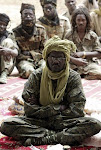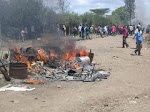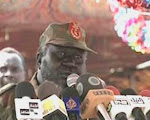All human beings are born free and equal in dignity and rights. They are endowed with reason and conscience and should act towards one another in a spirit of brotherhood — Article 1 of the United Nations Universal Declaration of Human Rights, Universal_Declaration_of_Human_Rights
In the previous features, "Integral" discussed the lack of democratic principles in South Sudan and how such disunite the people of South Sudan. It observed the values or pillars of democracy: sovereignty of the people; government based upon consent of the governed; majority rule; minority rights; guarantee of basic human rights; free and fair elections; equality before the law; due process of law; constitutional limits on government; social, economic, and political pluralism; values of tolerance, pragmatism, cooperation, and compromise, (http://usinfo.state.gov/products/pubs/whatsdem/whatdm2.htm).
It promised to examine each one of these pillars. It has already examined "sovereignty of the people"; "government based upon consent of the governed"; "majority rule"; and "Minority rights". Today, "Integral" is looking at "Guarantee of basic human rights" and observe whether or not basic human rights of the people of South Sudan are guaranteed by the government of South Sudan (GoSS) as stipulated in the Interim Constitution of South Sudan (ICSS). But first, let us see the meanings of each one of the words forming the basis for this argument: guarantee; basic; human; and rights.
Guarantee as a word has many meanings but for the purpose of this column, assurance – one of those many meanings – will be used. Basic, also with many entries in the dictionary, but for the purpose of this column, central – one of those many entries – will be used. Human, on the other hand, means manlike or that which is mortal – subjected to death. Rights mean those which are central in human need and deserved, especially in civil and political life. (Collins, 2000:274; 51; 298). Therefore, the phrase, guarantee of basic human rights could be rephrased as: assurance of central or pivotal desires of all South Sudanese.
Human rights refer to the basic rights and freedoms to which all humans are entitled. Examples of rights and freedoms which are often thought of as human rights include civil and political rights, such as the right to life and liberty, freedom of expression, and equality before the law; and socio-cultural and economic rights, including the right to participate in culture, the right to food, the right to work, and the right to education; free and fair elections; and the right to live free from discrimination on the basis of sex, race and religion
Every culture and major religions of the world recognise human rights in some form. For example, the Christian religion's Ten Commandments: "Thou shall not kill", http://www.christianhomesite.com/cherryvale/text/10command6.html is an expression of the right to life that is also recognised by all religions and governments of the world. South Sudanese have the same human rights entitlements; men, women and children, rich and poor, powerful and weak, beautiful or ugly, able or disabled, all tribes, all nationalities and faiths.
To respect someone's human rights means that you value another person as a fellow member of the human race rather than judge them on their appearance, background, race or gender, tribe or region. To respect human rights means that you believe everyone should live free from discrimination and have equal opportunity. This does not mean that differences among people should be ignored; but that we agree to treat people equally and the problems that exist, fairly and reasonably, regardless of the differences that exist.
In South Sudan, some individuals within GoSS have been seen to discriminate the people on the basis of which tribe does one come from; political parties does someone belong to; and phrases like; 'if you are not with us then you are with the enemy.' Tribalism and nepotism have both been seriously used by some individuals within the GoSS to draw lines between who is loyal to SPLM/A and who is not. Tribalism and nepotism have both frustrated the efforts of many South Sudanese who are seeking and continue to seek employment.
Tribalism and nepotism are making few individuals in GoSS acquire a new understanding that states: 'since others did not participate in the liberation struggle, they should not expect to get jobs, own lands and even have the right to live'. "Integral" will try to examine origins of tribalism and nepotism and their impact on the basic human rights of the people in South Sudan; and how such widens rather than closes the gap of disunity in South Sudan.
Tribalism is a noun that means "loyalty to a tribe." It originates from another noun: tribe, which means a "group of clans or families believed to have a common ancestry", (Collins, 2000:635).
"Integral" had made its views on tribalism very clear in one of its features which dealt with tribalism. It categorically stated that tribalism is an important organizational setup in societies because it ensures unity of a tribe. It eases common difficulties in achieving unity of purpose in a tribe. It secures the tribe from any dangers in case it is threatened. If led by wise people, it could generally work towards ensuring universal peace and establishment of law and order within a larger community of people or state. "Integral" added that, for tribalism to achieve universal peace, it has to explore newer horizons like looking beyond the tribe. Social Contract theorists would understand this perfectly well as Thomas Hobbes states here bellow:
"Men can be expected to construct a Social Contract that will afford them a life other than that available to them in the State of Nature. This contract is constituted by two distinguishable contracts. First, they must agree to establish society by collectively and reciprocally renouncing the rights they had against one another in the State of Nature. Second, they must imbue some one person or assembly of persons with the authority and power to enforce the initial contract. In other words, to ensure their escape from the State of Nature, they must both agree to live together under common laws, and create an enforcement mechanism for the social contract and the laws that constitute it" – Thomas Hobbes.
However, it should be understood that by all the readers of this column that it is human to practice tribalism but not nepotism for the general welfare of mankind. Nepotism is the true origin of tribalism. Some of the readers would certainly beg to disagree with this notion. However, they should hear out this argument.
Nepotism means favouritism in business shown only to relatives and friends (Collins, 2000:409). Given the extension of families in African households and knowing the fact that the first friends anyone from a particular tribe would tend to make are people from his/her own tribe, it is obvious that the bond of friendship is greater at the age set levels. In most cases, age sets grow up in a village and as such tribe binds them more than anything else.
Language, which is the main binding aspect in tribal existence, plays a greater role in provoking memories of childhood. Once provoked, the bond between those friends would grow stronger and stronger to the extent that one would be excited and do almost anything to the other friend without necessarily realizing it. This cannot go without stepping on a few toes; and it is the continued stepping on other people's toes, which increases in degree that eventually turns out to become tribalism.
In South Sudan, the Dinka were the first to be accused of practicing tribalism. This happened during the initial formation of the Anyanya Movement in 1963 when Sudan African National Union (SANU) split into two, http://www.sudaneseonline.com/earticle2005/may12-89513.shtml This was not as serious as it became to be known later. After the Addis Ababa Agreement of 1972, the Dinka tribe was believed to be practicing excessive tribalism. Equatorians and other smaller tribes in South Sudan believed that the Dinka tribe had occupied almost all the sensitive position in the Regional Government of South Sudan then known as the High Executive Council. That was not tribalism but rather an overstretched nepotism, one would state.
When the South was divided into three provinces called regions, http://www.islamfortoday.com/sudan.htm the Dinka went to the bush in mid 1983 to form the SPLM/A. In the three Southern regions tribalism was noticed by the minorities in each of these regions. In Upper Nile for example, the Nuer were said to be dominating. In Equatoria, the Bari tribe in Central Equatoria were said to be dominating the other tribes. These dominations were felt because nepotism was at its height but not tribalism as such. The further re-division of the South into ten states caused the accusation of tribes like Bari in Central Equatoria; Otuho in Eastern Equatoria, Nuer in Upper Nile, Zande in Western Equatoria; just to mention but a few; as dominating in their respective states.
If excessive nepotism that is now being practiced by almost every tribe in South Sudan has turned into tribalism, it is because the GoSS has failed to outlaw it. The author of "Integral" has made it clear to a few friends in the late 1980s of the last century that the SPLM/A had the opportunity to outlaw tribalism but it encouraged it instead. "Integral" now believes that the overstretched nepotism could be simply addressed by GoSS. GoSS is in a position to request for legislation from the SSLA that could outlaw nepotism and any symptoms of tribalism.
Having failed to address nepotism in the SPLM/A as a movement then and now SPLM/A as a government, the degree of nepotism has heightened. This heightened nepotism has caused the suffering of very many South Sudanese. Some individuals have used it to rob people of their properties such as land. Physically torturing innocent South Sudanese and detaining them in jails for years and years without trial. People have been killed as they tried to defend themselves from being robbed, raped etc; the list is long of the many atrocities committed against the innocent South Sudan in the name of this excessive nepotism, which in no doubt has now seriously developed into a fully-fledged tribalism.
Majority of the people of South Sudan, especially those who do belong to minority tribes have each seen the ugliness of tribalism and nepotism in South Sudan. Some of them have been made to believe that they in fact are in South Sudan by mistake. Equatorians for that matter have been told to go back to Kenya, Uganda, DR Congo and the Central African Republic. A few individuals from the SPLM/A have made this clear to many Equatorians in many occasions. There are many cases that could not even be addressed by the land commission in the state governments, let alone the GoSS because many senior SPLM/A officials – extremely powerful – are involved.
The security apparatus in South Sudan, including the ministry that is in charge of the security and that in charge of legal affairs have reflected the seriousness of nepotistic exercise. That is not a problem still but again a few individuals within the security and the ministries mentioned are not working for the general good of the people of South Sudan. This has resulted into the promotion of nepotistic interests and has been impacted on those killed, tortured and got their lands seized by none other than those individuals who have been employed through nepotism and are in their offices to protect nepotism.
There could be nothing more abusing to a person's basic human rights than being told that you are a foreigner in your own land; this is segregation on the basis of tribe. There is nothing more abusing to a human right than being protected by a tribal security, one which pays loyalty to a tribe and not the general public of South Sudan. There is nothing more abusing of human rights than taking the life of a countryman considered a traitor; torturing a countryman considered an enemy; and nothing could be more abusing when a person's land is seized by the force of arms.
All the above have been allowed to happen because the decision-makers in South Sudan are incapable of stopping them. It appears that anyone who intends to stop these ugly practices will have to note that s/he may lose popularity in the tribe and instead of stopping it; s/he would turn a blind eye instead.
The deliberate turning of blind eyes on things that are happening in South Sudan have seriously caused disunity between the people of South Sudan. Many minorities within the South have realised that South Sudan may not be a place for their survival and as such may choose to leave the South altogether. This is probably what the few individuals who are causing havoc in South Sudan want. But the serious politicians should really consider that they will be losers in a case like this? It is obviously he who intends to rule who must guarantee the basic human rights of all the citizens in the country. Because he who wants to rule will need as many countrymen as possible in order to win the elections. There can be no shortcuts in situations like these unless a politician is attempting a political suicide.
As mentioned earlier in this column, it is human to practice tribalism but a tribe that practices nepotism to the extent that it forgets the purpose for his/her being in a public office should be made to know that human rights of many are compromised by him/her. Thus, one would argue, that there is obviously no reason for any tribe in South Sudan to insist that it mainly fought the war and as such tribes X, Y and Z which did not participate in the war have to be physically abused, robbed of their belongings, tortured or even killed. It is the physical abuse of innocent citizens, robbing of their belongings, torturing and even killing them – in a nutshell: violating peoples' basic human rights in the name of tribalism and nepotism.
It is such violations of peoples' basic human rights which GoSS needs to know that amount to its failure to guarantee basic human rights of all South Sudanese. It will be very unfortunate if the GoSS cannot realise that her continuation to sanction practices such as that of excessive nepotism and allowing it to develop into a fully-fledged tribalism is the direct cause of disunity in South Sudan. South Sudan is disunited and this disunity has been caused by a mere misbehaviour of few SPLM/A officials who could have otherwise been controlled for the general good of the people of South Sudan.
It is not too late for SPLM/A as the party running the South now to address the issues that cause disunity in South Sudan. African National Congress in South African did bring unity in South Africa by creating a Truth and Reconciliation Commission (TRC), http://www.doj.gov.za/trc/trc_frameset.htm The TRC did not only unite the blacks in South Africa but also the whites found South Africa a home compared to none, irrespective of what they did to the blacks during the apartheid era.
Wednesday, August 20, 2008
Guarantee of basic human rights
Subscribe to:
Post Comments (Atom)







No comments:
Post a Comment